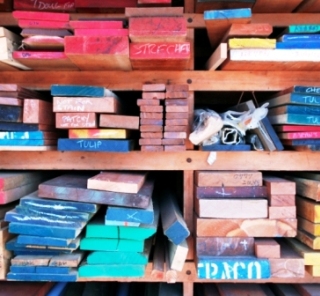A British timber operator has been fined £4,000 for breaching the EU Timber Regulation (EUTR) by importing a batch of FSC-certified West African hardwood without conducting satisfactory due diligence as required under the regulation.
The prosecution was solely focused on the company’s due diligence systems relating to its purchases of FSC-certified Ayous hardwood from Cameroon in January 2017. The Government acknowledged that although none of the material imported was from an illegal source, the company had failed to adequately check the legality of the timber when placing it on the market.
Having co-operated fully at every stage during the investigation, the company, Hardwood Dimensions (Holdings) Ltd, pleaded guilty to an offence on 2nd March 2018.
 First enforcement action from new Government office
First enforcement action from new Government office
The fine marked the first enforcement action carried out by the Government’s new Office for Product Safety and Standardssince its establishment earlier this year. Last year designer furniture retailer Lombok became the first UK business to be fined for breaching the EUTR.
Hardwood Dimensions (Holdings) Ltd have now adopted a Due Diligence toolkit and along with the support of BEIS and the Timber Trade Federation have now implemented it across all of the products they place on the EU market.
BWF Policy and Communications Executive Matt Mahony commented on the news:
“Having all operators fully engage with the regulation is the only way to ensure that no illegal timber or timber products can be sold in the EU.
“The rules can appear tight but it is essential that they are enforced to protect the work that has been done to encourage sustainable forestry here and abroad and support the use of what is a fantastic, renewable material.
“Companies bringing timber products in directly from outside the EU need to have their own due diligence system in place even for one-off transactions and cannot rely on suppliers to carry this out on their behalf. This must include information about the supply of timber products, an evaluation of the risk of placing illegally harvested timber and timber products on the market and necessary steps to mitigate this risk; for example additional information and third party verification.
“Simply bringing in FSC, PEFC or similar Chain of Custody certified timber is not enough to satisfy the due diligence requirements for these importers, although FLEGT licenced timber would suffice.”
 What are the rules?
What are the rules?
Although using certified timber from the major responsible sourcing schemes does go some way to mitigating the risk of illegal timber, a company placing their timber and timber products on the EU market would still have to adhere to the due diligence process – and of course, you can’t do retrospective due diligence.
All timber and timber products with a FLEGT licence automatically comply with the EU Timber Regulation. This means that when purchasing FLEGT-licensed timber, EU operators do not need to carry out additional due diligence checks. Indonesia is the first country to begin FLEGT licensing.
Companies trading in timber and timber products within the EU – and this would include most UK joinery businesses timber transactions – must essentially just keep records of sale and purchase for at least five years
How BWF can help with EUTR compliance
BWF has provided guidance, FAQs and a template due diligence system that member joinery companies can use to stay on top of the rules. We have adapted the BWF Code of Conduct to draw attention to the regulation and here you can find out more about what joinery manufacturers need to do to meet the EU Timber Regulation and how easy it has been.
